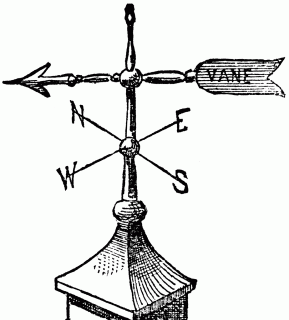The Wind in Both Ears
By Gail Forsyth-Vail

One of my favorite quotes, one that guides my religious and spiritual life, comes from Universalist religious educator and minister Angus H. MacLean (1892-1969). A Presbyterian Canadian farm boy of Scottish heritage from Nova Scotia, MacLean grew up to be a beloved professor and dean at the Theological School of St. Lawrence University, a Universalist seminary. He was fond of metaphors from rural life, such as this one:
My father sent me up from the root cellar to see about the wind. He was rechecking the winter’s potatoes to remove all signs of rot and was planning on setting out nets for some fresh cod later on. Was there a steady breeze, he wanted to know. Yes, there was. “Now face it,” he said, “so that the wind sings in both your ears. Then tell me where you nose points to.”
MacLean goes on to say:
We wonder about truth, about all the whats and whys and whithers of life. Wondering is very important, but it should bear the fruits of faith and thought, and it should turn our faces to whatever is coming down the winds of time and circumstance.
MacLean touches something essential about our liberal faith. To keep our faith vibrant and relevant, we must:
- Be curious; seek new perspectives and ways of understanding the world
- Pay attention to the challenges of our own day
- Explore how our values and tradition call us to response and to action
In this spirit, we name scientific discovery, the rhythms of the natural world, and wisdom from the world’s religions as sources of our faith. In this spirit, we include among our sacred stories tales that offer a fresh perspective or challenge our tried-and-true ways. In this spirit, we include social action and justice-making, not as nice add-ons but as essential parts of our faith formation programs.
One of my favorite parts of developing curricula and resources for Unitarian Universalists is this: The faith formation tools we offer are never just about content, and not just about being curious and learning new things. They are not just about telling and examining our own stories and attending carefully to those of other people. They are not just about working to bring more love and justice into the world. The tools we develop aim to do all this, and more: To nurture Unitarian Universalist spirits to hear and meet the particular winds that blow in our own time.